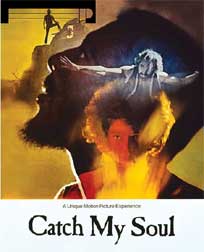 CATCH
MY SOUL (1973) Blu-ray/DVD combo
CATCH
MY SOUL (1973) Blu-ray/DVD comboDirector: Patrick McGoohan
Etiquette Pictures
 CATCH
MY SOUL (1973) Blu-ray/DVD combo
CATCH
MY SOUL (1973) Blu-ray/DVD comboTHE PRISONER's Patrick McGoohan made his feature directorial debut with the rock musical version of Shakespeare's "Othello" CATCH MY SOUL, resurrected on Blu-ray/DVD combo by Vinegar Syndrome sister company Etiquette Pictures.
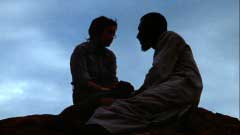
British producer/actor Jack Good's (CLAMBAKE) version of Othello (singer Richie Havens, GREASED LIGHTNING), a wandering preacher who has come upon Iago's (THE A TEAM's Lance LeGault) "Tribe of Hell" commune in New Mexico and converted them to Christianity. Although Othello believes he has also freed Iago of evil, Iago is, or at least believes he is, Satan himself; and the devil sets out to "catch" Othello's soul ("We're gonna do a Black Mass on his black ass"). When Iago notes the closeness between reformed drunk Michael Cassio ("Polk Salad Annie" singer Tony Joe White) and the preacher's new bride Desdemona (Season Hubley, VICE SQUAD), he decides to play on Othello's jealousy by inferring a sense of overfamiliarity in the innocent interactions between preacher's wife and deacon (a position for which Iago was passed over in favor of Cassio). With the help of his faithful few – who travel the countryside in a school bus painted all black on the outside and blindingly white on the inside, Iago gets Cassio and the rest of the commune into a drunken brawl on the couple's wedding night ("Drink the wine, eat the bred; that's what the Good Lord said"), causing Othello to renounce Cassio and abandon his flock. Othello and Desdemona find a derelict church and set about rebuilding it. Iago advises the disgraced Cassio to ask Desdemona to plead his case to Othello while Iago offers the service of himself and his "old lady" Emilia (Susan Tyrrell, NIGHTMARE MAKER) in the guise of distracting Othello for Cassio. With a few well-placed remarks and an incriminating handkerchief, Iago drives Othello to abandon his calling ("For if she be false, so are they all false") and to epileptic levels of madness. Emilia feels guilty about her part in Iago's plan and has come to admire the pure Desdemona, but those familiar with the source play know she will be too late to prevent the tragic denouement.
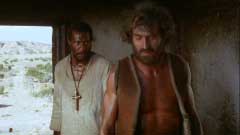 Conceived
as a stage play by actor-turned-producer Jack Good, CATCH MY SOUL first played
on stages in Los Angeles in 1968 with William Marshall (BLACULA) as Othello
and Jerry Lee Lewis as Iago (Marshall would star in a 1981 Franklin Melton production
with Ron Moody and Jenny Agutter). In light of the Tate-Labianca murders, Good
reworked the play and moved it to the London stage in 1969 playing Othello himself
for a time. The success of other rock musicals turned into movies like HAIR
and GODSPELL was responsible for greenlighting the film, which would be helmed
by actor Patrick McGoohan, who had directed a handful of episodes of THE PRISONER
(Good retained the possessory credit over the title as writer and producer).
Although the resulting film may be mesmerizing to contemporary viewers like
myself, it was not well-received theatrically and disappeared after a brief
theatrical issue and a reissue under a different title (see below). Long unavailable,
the film was at the center of a gap in McGoohan's career as actor with 1971's
MARY, QUEEN OF SCOTS on one side and Damiano Damiani's 1975 Terence Hill comic
western A GENIUS, TWO FRIENDS, AND AN IDIOT on the other. The religious elements
added to the adaptation by Good manage to emphasize the conflict between good
and evil without taking away from the complexity of Iago (it also adds a poignant
image in which a dying character briefly hallucinates a dagger as a cross, suggesting
a recovery of faith).
Conceived
as a stage play by actor-turned-producer Jack Good, CATCH MY SOUL first played
on stages in Los Angeles in 1968 with William Marshall (BLACULA) as Othello
and Jerry Lee Lewis as Iago (Marshall would star in a 1981 Franklin Melton production
with Ron Moody and Jenny Agutter). In light of the Tate-Labianca murders, Good
reworked the play and moved it to the London stage in 1969 playing Othello himself
for a time. The success of other rock musicals turned into movies like HAIR
and GODSPELL was responsible for greenlighting the film, which would be helmed
by actor Patrick McGoohan, who had directed a handful of episodes of THE PRISONER
(Good retained the possessory credit over the title as writer and producer).
Although the resulting film may be mesmerizing to contemporary viewers like
myself, it was not well-received theatrically and disappeared after a brief
theatrical issue and a reissue under a different title (see below). Long unavailable,
the film was at the center of a gap in McGoohan's career as actor with 1971's
MARY, QUEEN OF SCOTS on one side and Damiano Damiani's 1975 Terence Hill comic
western A GENIUS, TWO FRIENDS, AND AN IDIOT on the other. The religious elements
added to the adaptation by Good manage to emphasize the conflict between good
and evil without taking away from the complexity of Iago (it also adds a poignant
image in which a dying character briefly hallucinates a dagger as a cross, suggesting
a recovery of faith).
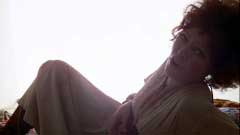
Iago has been interpreted by some as having qualities of the devil and as a trickster character by other. Even without the added religious elements here, Iago's single-minded campaign to so thoroughly destroy Othello makes him seem more demonic than an agent of chaos; in any case, LeGault is wholly possessed in a role he played on the London stage. Tyrrell is also captivating as the saucy but sincere Emilia with her best moments late in the film expressing her anger at Othello and Iago as well as her remorse. Havens and Hubley are overshadowed by the other two (although one could argue that Iago and Emilia have always been the more interesting characters in the play), and White also comes off better having written the score's new songs and managing to play himself while seeming less stilted and a bit more naturalistic delivering some of The Bard's antiquated dialogue. It is the almost non-stop score – including the White-penned new songs are supplemented, songs from the earlier versions by Good as well as some by Havens, and underscore by Paul Glass (LADY IN A CAGE) – and the intoxicating desert vistas and transitions from candlelight to pitch darkness of celebrated cinematographer Conrad Hall (THE OUTER LIMITS) that help hold things together even as Richard A. Harris' (TERMINATOR 2: JUDGMENT DAY) rough assembly was restructured by Sid Levin (MEAN STREETS) after test screenings (in some ways, the rustic look and loose feel of the film are reminiscent of Pier Paolo Pasolini's "Trilogy of Life" historical and mythical films). Among the "Tribe of Hell" are folk singers Bonnie and Delaney Bramlett.
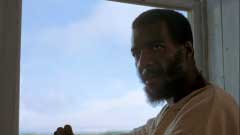 Given
scant theatrical release by Cinerama Releasing and then a later reissue by New
Line Cinema under the title SANTA FE SATAN (the title on this transfer), CATCH
MY SOUL has been meticulously restored frame by frame from a 2K scan of the
original 35mm camera negative. Purposeful use of lens flare in the sunny vistas
and the night bonfires occasionally occludes the image, but the painterly images
are biased towards browns and oranges with occasional interjections of contrasting
colors. Only one shot looks truly bad, although this appears to be an optical
enlargement meant to punch up a lengthy shot. The DTS-HD Master Audio 1.0 mono
track conveys the score and the dialogue with nice clarity and impressive depth
throughout. The optional English subtitles could use some proofing as they occasionally
refer to Emilia as "Amelia" and seem to mis-transcribe one or two
muttered lines.
Given
scant theatrical release by Cinerama Releasing and then a later reissue by New
Line Cinema under the title SANTA FE SATAN (the title on this transfer), CATCH
MY SOUL has been meticulously restored frame by frame from a 2K scan of the
original 35mm camera negative. Purposeful use of lens flare in the sunny vistas
and the night bonfires occasionally occludes the image, but the painterly images
are biased towards browns and oranges with occasional interjections of contrasting
colors. Only one shot looks truly bad, although this appears to be an optical
enlargement meant to punch up a lengthy shot. The DTS-HD Master Audio 1.0 mono
track conveys the score and the dialogue with nice clarity and impressive depth
throughout. The optional English subtitles could use some proofing as they occasionally
refer to Emilia as "Amelia" and seem to mis-transcribe one or two
muttered lines.
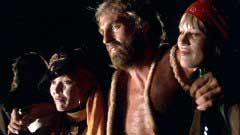
"Drink the Wine, Eat the Bread" (20:50) is an overview of the film through the separately interviews with executive producer Charles Fries (FLOWERS IN THE ATTIC) and associate producer Huw Davies (THE LOST BOYS). Fries recalls how early in his career he had mounted a couple theatrical productions in England (including TALES FROM THE CRYPT and VAULT OF HORROR) – having only produced a couple TV movies stateside – and was trying to set up operations over there when he met Jack Good and saw the stage production of CATCH MY SOUL. They discuss the New Mexico shooting, McGoohan's disregard of the schedule and script in favor of his choices (which lead to him banning Good and Fries from the set), Fries' dealings with Cinerama's Joseph Sugar, who kept the film on screens for a week as a favor, and then New Line Cinema (the retitling of which Davies felt was crass and disrespectful). They were disappointed by the film's reception at the time but hopeful about its rediscovery. In "The Deacon Speaks" (11:27), Tony Joe White recalls how Good approached him to record new music for the film version and then tried to convince him to act in the film as well. He speaks warmly of his co-stars and recalls that the bonfire scene was as wild in real life as it looked on film with McGoohan not offering him much direction other than when to stop swinging the torch around.
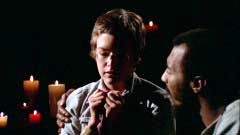 In
"True Soul" (8:05), Conrad Hall's daughter Naia talks about her father's
beginnings in film (picking the position of cinematographer out of a hat on
a USC student film competition to win a camera), his work on THE OUTER LIMITS
(which he would bring home to screen for his family on their projector), and
some of his early credits. She had not seen or heard of CATCH MY SOUL until
recently and is at a loss as to why her father never discussed it, but she assumes
that he became involved with it through Tyrrell with whom he had just worked
on FAT CITY. She also briefly touches upon the hallmarks of his cinematography.
The Cinerama theatrical trailer (1:54) is in black and white for some reason
while the TV Spot (1:00) is in color. Also included is Promotional Still Gallery
(2:48) as well as a twenty-six page booklet by McGoohan biographer Tom Mayer
which gives a thorough accounting of the production from stage to screen to
its reception with quotes from interviews with Hubley and Raleigh Gardenhire
(who plays Iago's associate unnamed in the film with his role substantially
diminished but the equivalent of Roderigo in the play). (Eric
Cotenas)
In
"True Soul" (8:05), Conrad Hall's daughter Naia talks about her father's
beginnings in film (picking the position of cinematographer out of a hat on
a USC student film competition to win a camera), his work on THE OUTER LIMITS
(which he would bring home to screen for his family on their projector), and
some of his early credits. She had not seen or heard of CATCH MY SOUL until
recently and is at a loss as to why her father never discussed it, but she assumes
that he became involved with it through Tyrrell with whom he had just worked
on FAT CITY. She also briefly touches upon the hallmarks of his cinematography.
The Cinerama theatrical trailer (1:54) is in black and white for some reason
while the TV Spot (1:00) is in color. Also included is Promotional Still Gallery
(2:48) as well as a twenty-six page booklet by McGoohan biographer Tom Mayer
which gives a thorough accounting of the production from stage to screen to
its reception with quotes from interviews with Hubley and Raleigh Gardenhire
(who plays Iago's associate unnamed in the film with his role substantially
diminished but the equivalent of Roderigo in the play). (Eric
Cotenas)